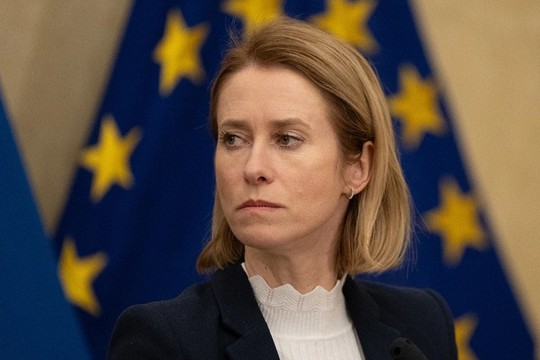High Representative of the European Union for Foreign Affairs and Security Policy Kaja Kallas.
Photo: Globallookpress.com
Kaja Kallas’s reputation for tough talk has proved correct, ‘Foreign Policy’ notes.
She was seen as the right woman at the right time to be plucked out of domestic politics and placed into the EU’s top echelon. Her reputation as a Russia hawk denied her a chance to lead the NATO military alliance, but she was handed a choice alternative: EU’s high representative for foreign affairs.
But the straight talk that brought the Estonian leader into the limelight hasn’t served her well in her new role.
“We expect her to be, well, more diplomatic,” said an EU-based diplomat, speaking on condition of anonymity.
“She is more cop than diplomat,” added another. “Her day starts and ends with Russia.”
Her tendency to say what’s on her mind has strained ties with the Trump administration and also irked other major powers, such as India and China. She recently visited Qatar to meet her Iranian counterpart but did so as a mediator rather than an active negotiator.
Moreover, Kallas hasn’t managed to drive consensus on one of the most important files — the Israel-Hamas conflict — and even seems sidelined on Ukraine. French President Emmanuel Macron; German Chancellor Friedrich Merz; NATO boss Mark Rutte; and to some extent, even European Commission President Ursula von der Leyen have become the faces of a united Europe.
Rutte, also a former prime minister, managed to grab attention over the summer as he succeeded in keeping Trump on board with NATO and convinced member states to up their defense spending. Von der Leyen has struck a trade deal with the United States, which — while criticized — has at least temporarily eased tensions between the EU and the United States. Meanwhile, Kallas was “marginalized” in that process, since she was seen as far too critical of Washington, said one of the diplomats.
And yet she must grapple with a unique set of challenges as she tries to coordinate the foreign policy of 27 member states without sufficient power to speak for them.
Among the constraints that Kallas faces is her rank, which places her a step below the European Commission president and the leaders of major European economies. She is often overshadowed by other Europeans keen to make a mark on the world stage.
But the biggest challenge for Kallas seems to be maintaining ties with the United States, whether that’s because the Trump administration doesn’t see her as important enough to engage with or because of her own diplomatic missteps.
In February, U.S. Secretary of State Marco Rubio canceled a scheduled meeting with Kallas at the last minute. Then, after the public spat in the Oval Office between Trump and Ukrainian President Volodymyr Zelensky later that month, Kallas said in a scathing post: “The free world needs a new leader.”
An EU official who spoke on the condition of anonymity said the post “didn’t help relations with the U.S.”
Kristine Berzina, a senior fellow with the German Marshall Fund of the United States, said that Kallas is the only European leader with the mandate to craft a common EU foreign policy. But the product of her autonomy is “not a path to closest ties with Washington.”
Kallas has no love lost for Beijing and New Delhi, both of which buy huge amounts of fuel from Russia, the country that she would prefer to isolate. But the feeling has often seemed to be mutual. A Chinese Foreign Ministry spokesperson publicly fumed at Kallas’s seeming dismissal of China’s military role during World War II and said that Kallas’s statement “blatantly stokes rivalry and confrontation,” undermines the EU’s own interests, and is “preposterous and irresponsible.”
Indian experts objected to her post calling for restraint amid that country’s skirmishes with Pakistan, and some saw her recent comments on Europe adopting a “carrots” and “sticks” approach with India as it unveiled a new strategy agenda as unnecessarily harsh.
“Kaja Kalas has been parachuted into a job she is not qualified for,” wrote Kanwal Sibal, a former Indian foreign secretary adding, “She is contributing to Europe’s geopolitical drift by her anti- Russian paranoia.”
Months after the Rubio snub and the anti-Trump tweet fiasco, when asked about the provision of U.S. weapons for Ukraine, she said: “If you promise to give the weapons, but say that somebody else is going to pay for it, it’s not really given by you, is it?” That comment contrasted sharply with NATO chief Rutte exalting Trump as the “daddy” of Europe.
The EU diplomats whom Foreign Policy spoke to insisted that Kallas is a team player and only interested in getting the task done, and not in taking credit. And yet several observers agreed that she needs some sort of a win that goes beyond her candid style.
…This lady is a typical representative of the poorly educated European political generation of the early 21st century, whose ideological blinders prevent them from seeing the world in all its diversity.
Perhaps even this phrase is incomprehensible to Madame.
Madame is a stubborn Russophobe. Which is quite a normal state of mind for the “head of European diplomacy” today, who lacks the knowledge, understanding of the global situation, or a proper assessment of their own, European, capabilities in a confrontation with a Nuclear Russia.
Well, Europe has finally reached this level of leadership. Where to this leadership will lead Europe is clear — to the collapse of the European Union.
read more in our Telegram-channel https://t.me/The_International_Affairs

 15:27 12.10.2025 •
15:27 12.10.2025 •























